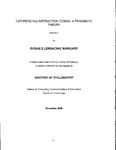EXPERIENCING INTERACTION DESIGN: A PRAGMATIC THEORY
| dc.contributor.author | WAKKARY, RONALD LENGKONG | |
| dc.contributor.other | School of Engineering, Computing and Mathematics | en_US |
| dc.date.accessioned | 2013-10-09T10:35:25Z | |
| dc.date.available | 2013-10-09T10:35:25Z | |
| dc.date.issued | 2009 | |
| dc.identifier | NOT AVAILABLE | en_US |
| dc.identifier.uri | http://hdl.handle.net/10026.1/2111 | |
| dc.description.abstract |
This thesis contributes a theory for the field of interaction design based on philosophical pragmatism. The theory frames interaction design as a pragmatic experience shaped by the inquiries of designers. The contributions of the theory are that it positions the designer at the centre of a theory, describes interaction design practice to be more than a collection of methods and strategies, and provides a sound basis for generating and verifying new knowledge through design. The thesis describes and analyzes two interaction design research projects through self-reflexive accounts that illustrate the proposed theory. The projects are a tangible museum guide and a responsive environment for physical play. The thesis examines the value of understanding interaction design through pragmatism and how interaction design when viewed as experience opens the field up to a new theoretical framework. The two interaction design research projects arc described as design inquiries constituted by a design inquirer, designer intentions, and design rationales. Further descriptions of the projects show interaction design to be comprised of design actions based on judgment and interpretation. Interaction design can be assessed by the degree to which there is integrity between the design inquiry and design actions, as well as by the transferability and discursiveness of the design inquiry findings that are relevant to the wider field of interaction design and related disciplines like human-computer interaction. The implications of the theory lead to new ways of mobilizing interaction design research and interaction design education. The pragmatic theory shows capacity for clear descriptions and analysis of interaction design inquiries in ways that extract and communicate new knowledge from interaction design practice and research. The theory shows interaction design to be a distinct and independent field of inquiry that generates knowledge through design. | en_US |
| dc.language.iso | en | en_US |
| dc.publisher | University of Plymouth | en_US |
| dc.title | EXPERIENCING INTERACTION DESIGN: A PRAGMATIC THEORY | en_US |
| dc.type | Thesis | |
| plymouth.version | Full version | en_US |
| dc.identifier.doi | http://dx.doi.org/10.24382/4235 |
Files in this item
This item appears in the following Collection(s)
-
01 Research Theses Main Collection
Research Theses Main



